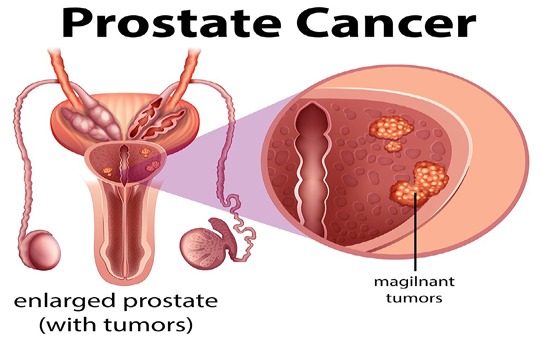Prostate Cancer
Prostate Cancer
- Most common cancer in American men, excluding skin cancer
- In 2006, 234,460 new cases diagnosed
- 1 in 3 men will be diagnosed in their lifetime
- Prostate is a muscular, walnut-sized gland the surrounds part of the urethra. Its primary function is to produce seminal fluid.
- Symptoms: nonspecific, weak or interrupted urine flow, difficulty starting or stopping urination
- Risk factors: age, race, nationality, family history, diet, lifestyle, and vasectomy
- Prevention: diet high in lycopenes, vitamin E
Causes of Prostate Cancer
- We do not know the cause of prostate cancer.
- Most likely cause is related to changes in the genetic material (DNA) in our cells.
- DNA changes can be passed down through families, or can occur due to environment or lifestyle.
Risk Factors
- Age
- About 6 out of 10 prostate cancers are found in men older than 65.
- Race/Ethnicity
- African-American men and Jamaican men of African ancestry have the highest risk and are more likely to be diagnosed at an advanced stage
- The reasons for these racial differences are unclear.
- Family history
- Having a father or brother with prostate cancer more than doubles a man's risk of developing this disease.
- The risk is much higher for men with several affected relatives, particularly if their relatives were young at the time the cancer was found. Most men diagnosed with prostate cancer do not have a family history of the disease.
- Genes
- Some inherited genes seem to raise risk.
- This accounts for only a very small number of cases.
- For most of these genes, genetic testing is not yet available.
- Diet
- High in red meat or high-fat dairy products and low in fruits and vegetables may raise risk
Can prostate cancer be prevented?
- Because the exact cause of prostate cancer is not known, at this time it is not possible to prevent most cases of the disease.
- Known risk factors such as age, race, and amily history cannot be controlled.
Lowering prostate cancer risk :
There are things that can be done that may help lower the risk of prostate cancer.
- Eat right
- Choose foods and beverages in amounts that help achieve and maintain a healthy weight.
- At least 2½ cups of vegetables and fruits each day
- Choose whole grains instead of refined grain products
- Limit red meats and processed meats
- Supplements
- Vitamin E and selenium have been studied; neither has been shown to lower risk.
- No vitamins or supplements have been proven to lower the risk of prostate cancer.
- Taking any supplements can have risks and benefits.
- Talk to your doctor before starting any vitamins or other supplements.
Early detection of prostate cancer
- Screening is testing to find cancer, or other disease, in people who have no symptoms.
- Screening can help find cancers in an early stage when they are small, have not spread, and are more easily cured.
- Screening for prostate cancer can be done with:
- Prostate-Specific Antigen (PSA) blood test
- Digital Rectal Exam (DRE)
Screening of prostate cancer
- Prostate-specific antigen (PSA)
- Made by cells in the prostate gland Most healthy men have a small amount of PSA [less than 4 nanograms per milliliter (ng/mL)] in their blood
- Digital rectal exam (DRE)
- Doctor puts their gloved, lubricated finger into the rectum to feel for any bumps or hard areas on the prostate that might be cancer
- May be uncomfortable, but shouldn’t cause pain and only takes a short time
- There are limits to the current screening methods:
- Neither the PSA test nor the DRE is 100% accurate.
- Abnormal results of these tests don't always mean that cancer is present, and normal results don't mean that there is no cancer.
- If cancer is found, neither test can tell how likely the cancer is to grow and spread.
ACS Recommendations for the Early Detection of Prostate Cancer
- ACS does not support routine testing for prostate cancer at this time.
- Men should talk with a health care professional to learn about the uncertainties, risks, and potential benefits of testing in order to make an informed decision about whether to be tested.
- Prostate cancer testing should not be done without giving each man a chance to make an informed decision.
- This discussion should begin in men with at least a 10-year life expectancy…
- At age 50 for men at average risk for prostate cancer
- At age 45 for men at high risk for prostate cancer
- African American men
- Men who have a first-degree relative (father, brother, or son) diagnosed with prostate cancer at an early age (younger than age 65)
- At age 40 for men at even higher risk
- Those with more than one first-degree relative who had prostate cancer at an early age


